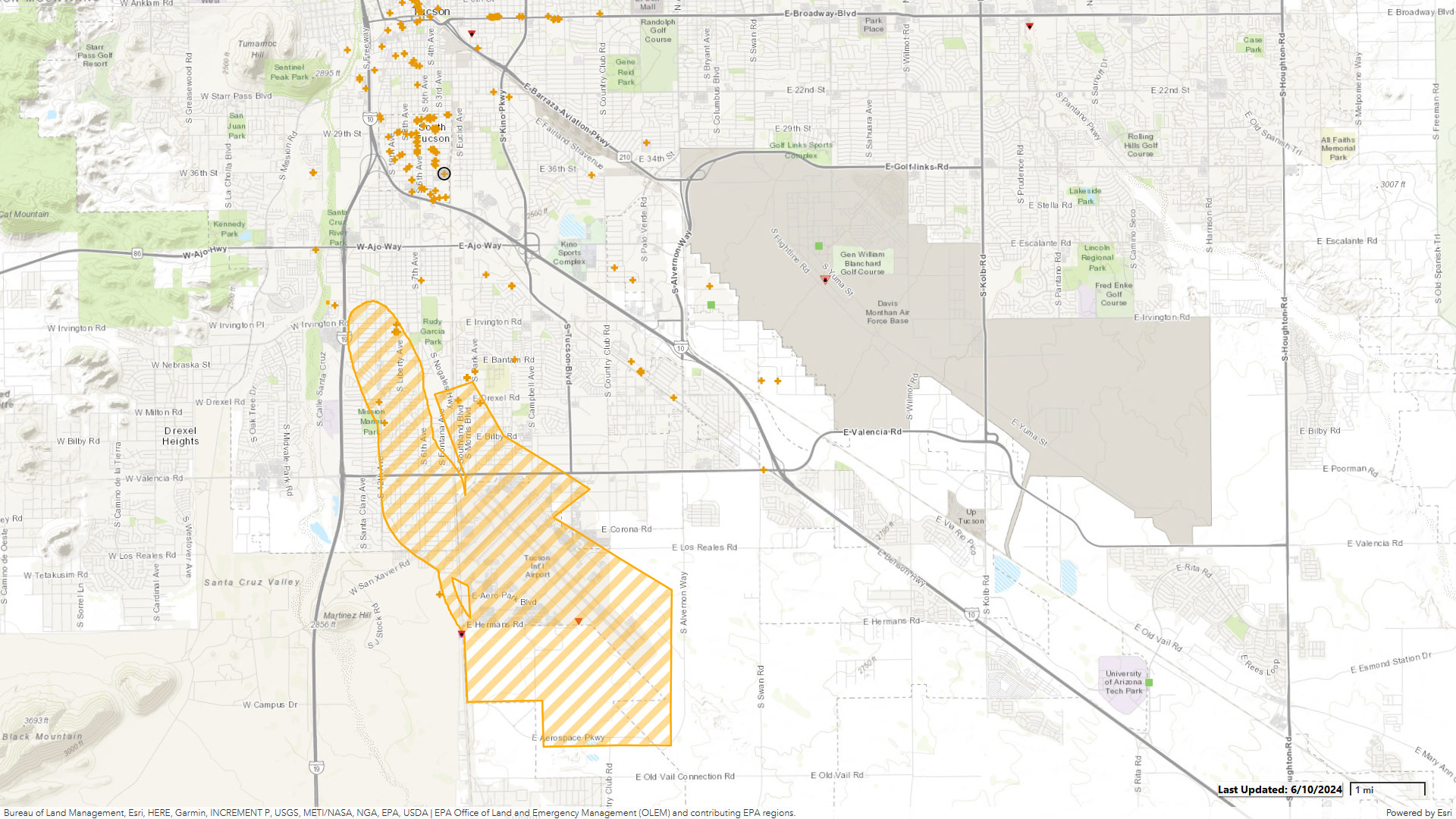 VIEW THIS MAP FULLSCREEN IN A NEW WINDOWThe ten square-mile Tucson International Airport Area Superfund Site is depicted using orange diagonal lines. The site includes Tucson International Airport, Sections of the Tohono O'odham Nation (San Xavier District), Tucson and South Tucson residential areas, and Air Force Plant #44 Raytheon Missile Systems Company (AFP44). The site has contaminated groundwater and soil from former aircraft and electronics manufacturing and aircraft maintenance, fire drill trainings, and the leaking of chemicals from unlined landfills.
VIEW THIS MAP FULLSCREEN IN A NEW WINDOWThe ten square-mile Tucson International Airport Area Superfund Site is depicted using orange diagonal lines. The site includes Tucson International Airport, Sections of the Tohono O'odham Nation (San Xavier District), Tucson and South Tucson residential areas, and Air Force Plant #44 Raytheon Missile Systems Company (AFP44). The site has contaminated groundwater and soil from former aircraft and electronics manufacturing and aircraft maintenance, fire drill trainings, and the leaking of chemicals from unlined landfills.
After decades of delay, the Environmental Protection Agency (EPA) has banned the use of trichloroethylene (TCE) and partial ban of perchloroethylene (PCE)– two hazardous chemical solvents known to cause cancer.
Under the EPA’s latest rule, all uses of the volatile organic compound TCE will be phased out over time while all consumer uses and some commercial use of PCE, will be banned under the bipartisan 2016 Toxic Substances Control Act (TSCA) amendments.
The protections align with President Biden’s Cancer Moonshot, a holistic government approach to ending cancer.
TCE, identified in the groundwater on Tucson’s south side in the 1980s, led to the area’s designation as a federal Superfund Site.
The chemical solvent was historically used in airplane degreasers and firefighting foam between the 1950s and 1970s at the Tucson International Airport, Morris Air National Guard Base, and what is now known as Air Force Plant #44.
Linda Robles, longtime resident of Tucson’s south side, calls the EPA’s new regulation a step in the right direction.
“People in the southside of Tucson have suffered severely resulting of TCE groundwater contamination that goes back to the 1940s in our community, many mothers in our community have experienced diseases and losses of their own children like myself,” Robles said.
Robles lost her daughter Tianna in 2007, to a rare form of cancer and kidney failure, which she believes were caused by TCE and other contaminants from the Tucson International Airport and nearby military facilities.
Following her daughter’s death, Robles founded Tucson’s Environmental Justice Task Force, a community-led group advocating for cleanup and regulation of hazardous contaminants like TCE since 2016.
Tasha Stoiber, a scientist with the Environmental Working Group (EWG) says this ban is a significant step for public health.
“TCE is carcinogenic to people by all relative exposure, that means oral exposure, drinking it in water, by inhalation, inhaling it from the air or by dermal exposure,” Stoiber said.
TCE can be found in dry-cleaning products and common household cleaning products, while PCE or “perc”, is used for dry cleaning and automotive care products.
According to the EWG, more than 80% of TCE is used to manufacture refrigerants.
Despite progress in federal protective action, advocates remain concerned about potential rollbacks under the Trump Administration.
Stoiber emphasized that these regulations affect everyone the same, despite political affiliation.
“PFAS for example,it’s linked to several different types of cancer, immune harm, harm to livers and kidneys, harm to reproductive health, harm to your thyroid, increased thyroid disease,” Stoiber said. “The EPA economic health benefit analysis shows this but utilities will fight these regulations because it’s in their interest to go against any perceived additional cost.”
PFAS or per- and poly-fluoroalkyl substances, are long-lasting, man-made chemicals that break down very slowly over time.
In April, the EPA announced its first-ever drinking water standard for PFAS.
Robles expressed concern that the Trump administration might prioritize corporate profit over public health.
“I’m just really concerned that they’ll undermine and sabotage or try to even dismantle this policy and not just this policy but other regulatory policies that we’re trying to address here in our communities, especially communities of color that are more disproportionately impacted by these issues,” Robles said.

By submitting your comments, you hereby give AZPM the right to post your comments and potentially use them in any other form of media operated by this institution.